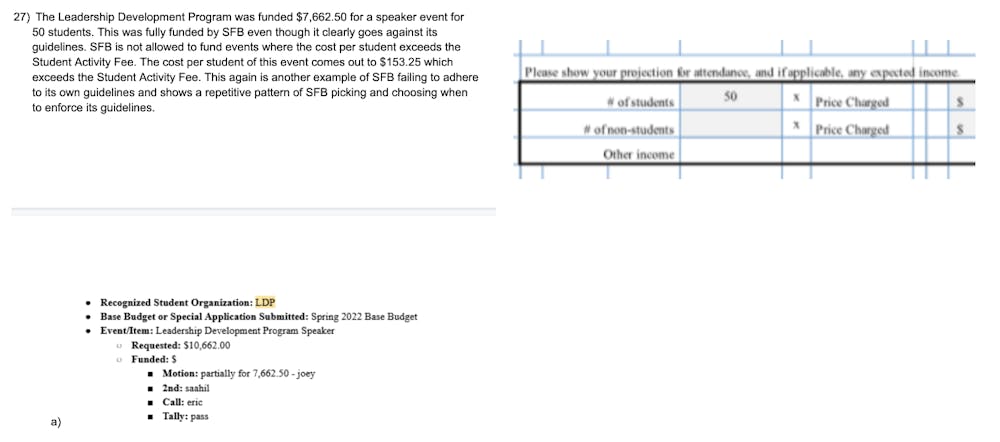By Rishi Shah
Director of Operations
The Student Finance Board (SFB), responsible for allocating roughly $1.9 million to Recognized Student Organizations (RSOs) throughout the academic year, holds a pivotal role in determining the fate of potential events at the College. Made up of 19 students, SFB is designed to distribute the Student Activity Fee (SAF) “in a financially responsible manner,” with members of SFB “expected to act in a fiscally responsible manner regarding the appropriation of Student Activity Fees.”
According to its Funding Guidelines, SFB can use financial and nonfinancial metrics to determine if an event is “fiscally responsible.” The only concrete rule in place is the cost per student metric that states that an event’s cost per student cannot exceed the total SAF charged to each student per year – $299.56. However, there has been concern as of late over the consistency of SFB’s decisions in funding certain requests over others, especially after they instituted a temporary pause in funding early in the spring 2022 semester.
Fiscal responsibility
The discretion that is given to SFB members in assessing the fiscal responsibility of a specific funding request means there are various interpretations of what is considered fiscally responsible or not.
Junior accounting major and Assistant Financial Director Joe Fardella defined fiscal responsibility as “a term that gets used when assessing a funding decision that requires a look at the bigger picture of a couple different things: the event itself and the time, possible attendance, has the event happened historically, is it an event that’s happened multiple times in the past.”
According to Sofia Papadopoulos, the sophomore executive assistant of SFB, it was difficult to exactly define fiscal responsibility. “I don’t think that at this moment we can on the record say what fiscal responsibility is other than, you know, reviewing those past decisions and reviewing the current restraints we’re put under.”
She added, “I just don’t think that we can define it – like me myself can define it without the board coming together and making that exact reasoning but I think it’s just really looking at the restraints and looking at the guidelines.”
The lack of a clear definition of what exactly fiscal responsibility means has led to the term being used as a blanket statement used to zero or partially fund events.
Operations Director of SFB Svanik Shirodkar, who is also the head of the student organization Late Night Take, explained that “the line of fiscal responsible, like whether an event is fiscally responsible or not, is just a catchall line that SFB uses when it’s kind of in the gray area whether or not the event should be funded.”
The blanket use of fiscal responsibility to deny funding for events can be seen in funding requests for the spring 2022 semester. 81 requests out of a total of 381 – more than 20 percent of all requests – were zero funded or partially funded for fiscal responsibility reasons.
Shirodkar also mentioned that “fiscal responsibility seldomly has been used as a reason to not fund something until more recently.” According to him, SFB has been more strict in funding requests lately and has been inconsistent with their decisions.
“I think the main issue is there is so much inconsistency that it’s coming to the point where it’s hurting organizations from receiving funding and actually being able to put on their mission,” he said.
A key point for Shirodkar was inconsistency in funding requests for food. The organization he heads, Late Night Take, appealed the lack of funding for food and a speaker event this semester in a 48-page document. In the appeal, Shirodkar highlighted the “discovery that SFB seemed to make decisions on a whim and did not have a consistent manner in making these decisions” after reviewing nearly 100 pages of meeting minutes.
The appeal included 27 instances of other RSOs being funded for food-related expenses and speaker costs with a similar or higher cost per student than Late Night Take’s events. As was noted earlier, the cost per student of an event is the only concrete financial metric in place to assess fiscal responsibility.
The appeal was approved to move to a hearing by a committee made up of two students and one staff member, and the appeal hearing board (consisting of three professional staff members) eventually sided with SFB's funding decision, according to Executive Director Neil Trivedi.
Shirodkar also argued that SFB was discriminating against his organization after “the impeachment trial did not go in the direction that certain members of SFB wanted,” referencing a formal removal hearing held in the fall 2021 semester to consider impeaching him. As Trivedi explained it, the hearing was based on Shirodkar's job performance and to assess whether he was fulfilling his duties as operations director during the eight office hours required of him per week. The motion to remove Shirodkar did not pass, and he is currently in the same position.
When asked about funding for food requests, Trivedi explained that the food should play an integral role in the event or club’s mission to be funded. “We look at the type of event and its overall purpose and what purpose the food actually serves,” the senior economics major said.
“Is it there just to attract people to come to the event or does it actually contribute to the overall mission or intended purpose of the event itself? Is great amounts that are being requested for food actually necessary for the event to take place or is it just a supplemental part that may not necessarily need funding for the event itself to prosper and reach a great amount of students?”
Cost per student
The inconsistency in the application of fiscal responsibility extends to the cost per student metric, as well. Despite the current Funding Guidelines’s statement that “no event’s cost per student may exceed the total Student Activity Fee charged to each individual student per year” of $299.56, SFB has instead used the SAF per semester – $149.78 – when considering whether to fund an event in the past year.
When senior biology major Kiran Pillai went to SFB looking to get funding for plane tickets for a dance competition at Purdue University as one of the captains of Saathiya, a Bollywood-fusion dance team on campus, she was told that the organization would only receive funding for $149.78 per person — the SAF that is charged to each student per semester.
In email correspondences between Saathiya and SFB, it is clear that each student was only able to be funded $149.78 for the trip, showing that this amount was considered the cost per student for an event at the College in contradiction to the Funding Guidelines.
After being provided the $149.78 in funding per person, Pillai noted that each student was forced to pay the remaining amount. “After getting part of it funded from that $149 amount, we still had $120 per student cost so every student had to cough up $120. Asking a bunch of college students who a lot of times don’t really have a lot of income to cough up $120 is a lot.”

In an email sent to SFB, Saathiya requested that the amount of money left over from the $149.78 allocated to each person be used for hotel tickets (Photo courtesy of Kiran Pillai).
When Trivedi was asked about the cost per student guidelines, he admitted that the board may have gotten confused about the cost per student given the use of the semester SAF as the cost per student in past years but reiterated that most funding requests do not come close to the limit.
“Probably in that moment, board probably just operated with the $149.78 understanding, because past years, we’ve talked about it being half or the semester’s SAF so I believe we kind of got confused in the mix of emotions and stuff. That’s something that we’re going to fine tune.”
Trivedi explained that the $149.78 SAF is used as a soft metric for evaluating funding requests, which opens up the possibility of requests being approved if they exceed this amount but still have merit. He established the $299.56 limit as a hard stop that could not be surpassed, but said that requests over $149.78 could still be funded if deemed fiscally responsible.
“If there have been instances, which I take your word there have, that we have said no to orgs then that’s an oversight on SFB’s part and completely on us for the misinterpretation of the guidelines,” Trivedi said. “But it is something that we are going to have to address regardless because $299.56 per student is still insanely high and even still $149.78 we just use those numbers because that’s what the SAF is currently and it’s a good baseline but that’s not to say that that needs to be the number that we’re utilizing.”
While Trivedi cites the $149.78 as a soft limit for the per student cost, Pillai said that she was informed by friends on the board that the hard limit would be $149.78. “I was told by multiple people on board that it was $149, I never read the guidelines explicitly to notice that so I just followed what they told me,” she said after being informed that the cost per student limit was set at $299.56 according to the Funding Guidelines.
“I do know quite a few people on the board and that was something that was repeatedly discussed, but [when] I was in a presentation for a special app, they did discuss during the meeting itself, ‘oh, it had to fit within the $149 budget.’”
One particular event highlighted in Shirodkar’s appeal, the Leadership Development Program’s speaker event, stands out especially due to its cost per student. The event was approved for $7,662.50 for an expected turnout of 50 students, coming out to a cost per student of $153.25.
According to the appeal, “SFB is not allowed to fund events where the cost per student exceeds the Student Activity Fee,” which is $149.78. This statement echoes Pillai’s comments about the board abiding by the $149.78 metric in funding decisions, despite Trivedi’s claims that the $149.78 number is used as more of a soft limit.

The speaker event hosted by the Leadership Development Program was expected to have 50 students in attendance, with $7,662.50 approved for funding (Photos courtesy of Svanik Shirodkar).
This event epitomizes the conflict surrounding the interpretation of the cost per student metric. If it is true as Shirodkar says that $149.78 was the correct hard limit for the cost per student allowed for an event, the decision to fund the event would go against the Funding Guidelines. If $299.56 was the correct hard limit (as was explained by Trivedi), Shirodkar, a high-ranking member of SFB, would have been operating with the incorrect cost per student in mind.
The meeting minutes and base budgets provided to The Signal include the amount of money requested by organizations but not the number of students expected to attend, which makes it difficult to determine the cost per student for each event. However, as seen with Saathiya, there appears to be conflict between the cost per student outlined in the Funding Guidelines and the cost per student used by SFB.
SFB’s response
While there are concerns with the vagueness of “fiscal responsibility” and the inconsistency associated with recent funding decisions, SFB is cognizant of such issues and is trying to face them head on.
“We want to do away with it, to be totally honest with you,” Fardella – who was recently elected as the executive director for the 2022-2023 year – said in reference to fiscal responsibility as a metric for approving funding requests. “Because there is a bit of vagueness to it, you know what I mean? So because there’s not as direct of a definition as it is stated in our guidelines with most other things, that’s kind of why we want to take a second look at it.”
At SFB’s March 23 meeting, the board also discussed plans to review their governing documents. The meeting was focused specifically on the Funding Guidelines, with each member present having the chance to explain their suggestions or input for what needed to be changed.
A common theme in the discussion was reforming the idea of fiscal responsibility. Many members agreed that funding decisions should be more consistent, with more structures and clarifications to aid RSOs in understanding the guidelines.
Christine Stellerine, the business manager and advisor for SFB, concluded the meeting by emphasizing the work that SFB had cut out for them. She noted that “[they] did have to use fiscal responsibility where [they] didn’t have to in the past” due to higher amounts being requested this year compared to past years, and that this meant funding criteria would need more scrutiny going forward.
“Anything that was a reason for why we didn’t fund, we need to go back and look at it and say like this is the decision that we made, do we want to stick with it? If we do, we have to put something in our funding guidelines so that we can point at it in the future and say this is the concrete reason,” she said. Because we can’t use fiscal responsibility for anything we’ve seen beforehand, we’ve used that.”







